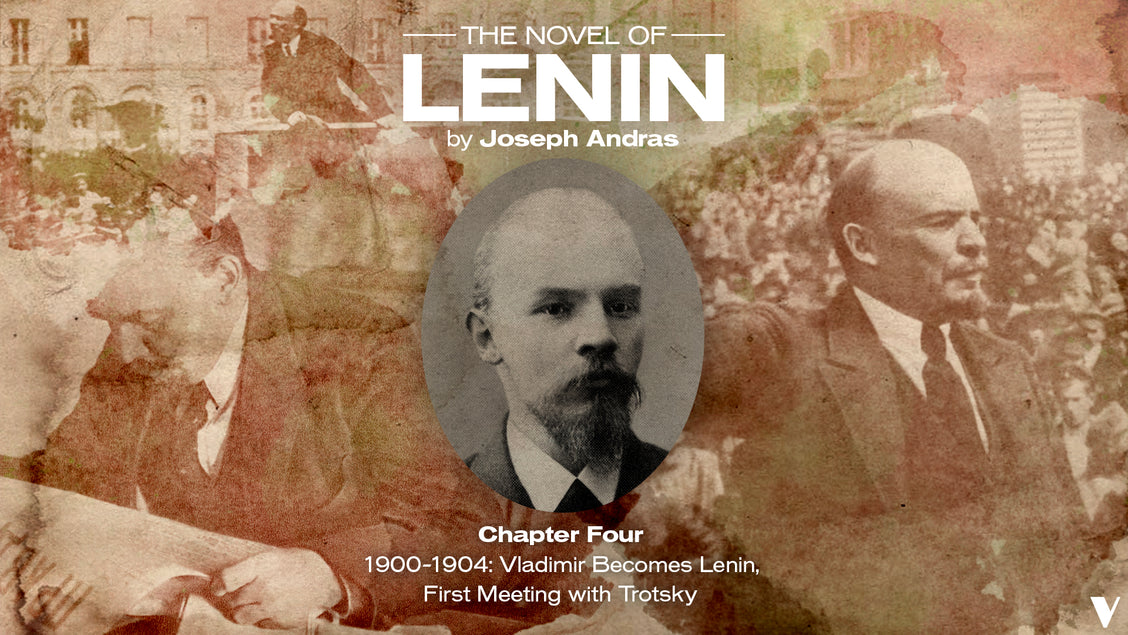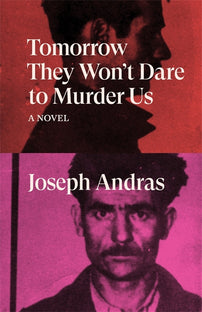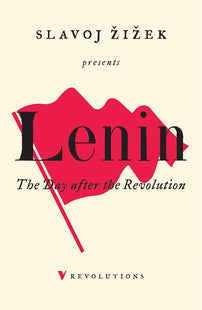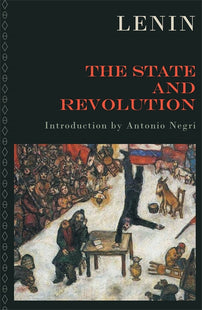The Novel of Lenin: Chapter Four
The fourth installment of our nine-part series: The Novel of Lenin by Joseph Andras: Vladimir Becomes Lenin, First Meeting with Trotsky.

Chapter Four
1900-1904: Vladimir Becomes Lenin, First Meeting with Trotsky
Vladimir permanently adopts the name Lenin. His What Is to Be Done? sees the light of day in 1902. He meets Trotsky, with whom he enters into complicated relations. Trotsky is already distancing himself.
We are in 1901. Lenin is born. And this birth occurs at the bottom of a letter addressed to Plekhanov. We don’t know why this pseudonym – perhaps after the river Lena. The revolutionary makes, over the course of his life, recourse to 148 names; from now on let's call him this.
He meets Rosa Luxemburg and then establishes, with his wife, a web of militants capable of diffusing and supporting Iskra at a distance. Lenin only has one idea in his mind: that the Russian Social-Democratic Workers Party (POSDR) must succeed in carrying the voice of the people in its entirety. Two of its ministers fall under the bullets of revolutionary socialists. A strategy that Lenin recuses. Individual terrorism cannot rally the masses or organize them. For the moment, only a journal can. What Is to Be Done? asks the very book he is working on. “When writing, he would usually pace swiftly up and down the room, whispering what he was going to write. I had already adapted myself to his mode of working, and when he was writing I never spoke to him or asked him any questions. Afterwards, when we went out for a walk, he would tell me what he had written and what he was thinking about,” writes Nadezhda Krupskaya. The book’s title is an homage to the celebrated novel of the same name by Chernyshevsky in 1863. The book of a generation, that Lenin had pulled down from his brother Aleksandr’s bookshelf and read with ardor. His own What Is to Be Done? sees the light of day in 1902. Lenin takes up the pen as he would a hunting rifle in Siberia: he speaks his mind to Bernstein and his followers. “This was synonymous with bourgeois democracy’s denial of socialism’s right to independence and, consequently, of its right to existence; in practice it meant a striving to convert the nascent working-class movement into an appendage of the liberals.”
What was needed was to persuade workers of the superiority of Marxist views. To persuade them from the “outside,” via trained, disciplined, and professional revolutionaries, built into a party avant-garde. The basis of Leninism is cast. The central refusal of “spontaneism” grants “mechanical overemphasis on organization,” Tony Cliff will comment, while admitting that Lenin had deliberately bent the stick too far. The police hike up surveillance, so the couple moves to London and tirelessly works on Iskra. The editorial committee includes six members –including Plekhanov– and, in October, Lenin meets Trotsky. The revolutionary had just arrived in England after managing to escape Siberia, hidden in a hay cart. Lenin, his senior by a decade, lives across the channel under the name Richter, and was keen to meet the man known at the moment for his writings as Pero. The two men meet; Lenin finds Trotsky lodging and hopes to take him on as editor. Hic: Plekhanov refuses. Tensions exist within the group and the latter suspects, it is said, that Trotsky would reinforce its Leninist pole. Trotsky, 23 years old, joins Iskra, but not its leadership. Isaac Deutscher, his biographer, will write: “Nobody believed in Iskra’s mission more ardently than Trotsky; and his writings pulsated with this belief.”
The second congress of the Russian Social-Democratic Workers Party takes place in Brussels at the end of July 1903. An old, shabby warehouse, a mere 40 delegates, police in the area. The congress moves to London. They bicker over the role of the peasantry, the conditions of party membership, they vote, Lenin intervenes 14 times, urging that Iskra’s leadership be reworked on a stricter basis. While the aim of the meeting was to unify revolutionary tendencies, two blocs immediately emerge: the majority (Bolsheviks) and the minority (Mensheviks). Lenin regrets this, even admitting that he had behaved "like an enraged man" during the exchanges. Trotsky distances himself, criticizing his comrade's harshness, Jacobinism, and Robespierrist leanings. The situation quickly goes from bad to worse. Minorities call for a boycott, Lenin resigns from the editorial board, Trotsky returns to Iskra. The tension once again takes its toll on Lenin, both in mind and body; he leaves the party council and seems to distance himself from political struggle. At least in appearance. At the end of 1904, he co-founds the newspaper Vperyod (Forward) with around 20 Bolshevik militants. He must start all over again. Overtake Iskra on the left. Years later, Lenin will call Trotsky "Judas" and a "pig".
This text was originally published by L’Humanité in a special edition commemorating the centenary of Lenin’s death. Translated from the French by Patrick Lyons.
Chapter Three: 1895-1900: Travels to Paris and Germany, the Creation of a Journal
[book-strip index="1"]






